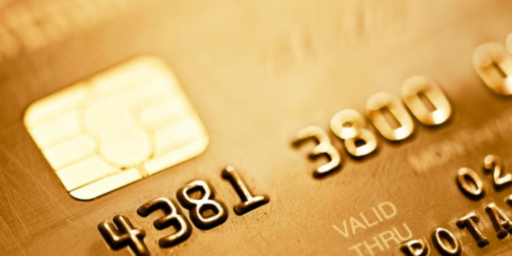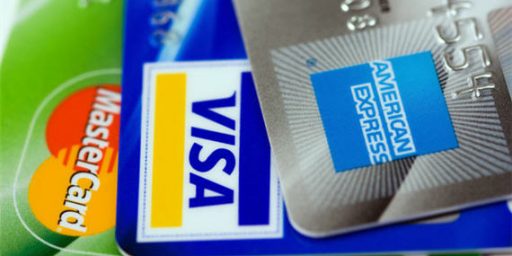Visa Dominates Debit Card Market by Charging More
Interesting analysis of the debit card industry by Andrew Martin, who explains how Visa gained dominant market share by charging more for its services.
When you sign a debit card receipt at a large retailer, the store pays your bank an average of 75 cents for every $100 spent, more than twice as much as when you punch in a four-digit code. The difference is so large that Costco will not allow you to sign for your debit purchase in its checkout lines. Wal-Mart and Home Depot steer customers to use a PIN, the debit card norm outside the United States.
Despite all this, signature debit cards dominate debit use in this country, accounting for 61 percent of all such transactions, even though PIN debit cards are less expensive and less vulnerable to fraud.
How this came to be is largely a result of a successful if controversial strategy hatched decades ago by Visa, the dominant payment network for credit and debit cards. It is an approach that has benefited Visa and the nation’s banks at the expense of merchants and, some argue, consumers.
Competition, of course, usually forces prices lower. But for payment networks like Visa and MasterCard, competition in the card business is more about winning over banks that actually issue the cards than consumers who use them. Visa and MasterCard set the fees that merchants must pay the cardholder’s bank. And higher fees mean higher profits for banks, even if it means that merchants shift the cost to consumers.
Seizing on this odd twist, Visa enticed banks to embrace signature debit — the higher-priced method of handling debit cards — and turned over the fees to banks as an incentive to issue more Visa cards. At least initially, MasterCard and other rivals promoted PIN debit instead. As debit cards became the preferred plastic in American wallets, Visa has turned its attention to PIN debit too and increased its market share even more. And it has succeeded — not by lowering the fees that merchants pay, but often by pushing them up, making its bank customers happier.
It’s a reverse form of competition but one that makes sense. The “customer” here is not really the card holder but the card issuer. For card holders, the amount charged merchants is immaterial so long as they don’t have trouble using their cards. Indeed, I don’t know offhand what my various cards charge merchants.
Critics complain that Visa does not fight fair, and that it used its market power to force merchants to accept higher costs for debit cards. Merchants say they cannot refuse Visa cards because it would result in lower sales. “A dollar is no longer a dollar in this country,” said Mallory Duncan, senior vice president of the National Retail Federation, a trade association. “It’s a Visa dollar. It’s only worth 99 cents because they take a piece of every one.”
Visa officials say its critics are griping about debit products that have transformed the nation’s payment system, adding convenience for consumers and higher sales for merchants, while cutting the hassle and expense of dealing with cash and checks. In recent years, New York cabbies and McDonald’s restaurants are among those reporting higher sales as a result of accepting plastic. “At times we have a perspective problem,” said William M. Sheedy, Visa’s president for the Americas. “Debit has become so mainstream, some of the people who have benefited have lost sight of what their business model was, what their cost structure was.”
James Kwak asks, “Tell me again, how does this benefit society?”
While this was meant rhetorically, the answer is that it has promoted ease of use. It’s inconvenient and dangerous to keep enough cash on hand for one’s purchases, so debit cards benefit consumers. Checks take quite a bit of time to process and are notoriously unreliable, forcing merchants to either accept the risk of nonpayment, pay for expensive verification systems, or both. Debit cards eliminate these hassles.
Nowadays, I use my debit card solely to withdraw cash from an ATM; I prefer credit cards that offer points toward airline miles and hotel stays. As a college student a quarter century ago, though, I used debit cards because I didn’t earn enough to get a credit card (Yes, there was a time when getting a credit card was tied to earnings!) and many merchants would not accept checks. Debit cards were a check replacement, since they were indistinguishable from credit cards.
ss






Sounds like a microcosm of medical care – someone else pays and then we all pay.
The proper point of comparison is not cash but PIN debit. And while signature debit is arguably easier to use than PIN debit, I’m skeptical that most consumers would agree that ease of use is worth $0.37/transaction. Andy is right – this is yet another situation where lack of price transparency has created opportunities for rent-seeking.
I think this part of the story demands attention:
Sounds like antitrust violation when a party uses its economic power to force the consumer to purchase a second, less desirable product (high fee debit cards) in order to have access to the desirable product (standard VISA credit cards).
How’s that any different than being forced to buy BET, HSN, and two dozen religious channels in order to get ESPN, USA, and SyFy?
One is bundling, the other is tying, which is to say, one is legal and the other violates anti-trust laws. I think it depends on the nature of competition in the market and whether the goods are seen as separate or complimentary.
But if I’d read further, I’d have seen the issue has been litigated and settled, at least as between Mastercard and the big box stores, which no longer are subject to the tying arrangements.
In case it’s not obvious, I don’t know the answer. But one of the things that bothers me is that credit card companies prohibit the merchant for marking up the difference between a card purchase and a cash purchase. If the merchant is paying a one percent premium for a card transaction, I don’t know why the merchant shouldn’t be allowed to pass on the savings from using cash to the consumer.
For the same reason Paypal won’t let you pass the paypal fee onto the buyer. Because then people might think twice about using paypal, and since paypal (visa and MC) is the only game in town, the seller has no choice but to obey.
“But one of the things that bothers me is that credit card companies prohibit the merchant for marking up the difference between a card purchase and a cash purchase. If the merchant is paying a one percent premium for a card transaction, I don’t know why the merchant shouldn’t be allowed to pass on the savings from using cash to the consumer.”
Clearly, you have not bought gas much recently, as the discount for cash/extra charge for credit or debit has been making a re-appearance in the last few months.
Fees on cards are much lower in the European Union as a result of regulation (as per economic theory, to reduce oligopolistic rents). Maybe there’s less access as a result, though if so I don’t think it’s dramatic (then again just because I don’t see it as a tourist doesn’t mean much).
Dantheman:
I’m not on top of the details, but my impression is there’s a legal cat-and-mouse game around the credit companies using their heft to try to stop merchants from charging a premium for plastic. A game the credit card companies usually win.
That doesn’t entirely comfort me, since I want more competition to keep the system efficient. But paypal might suggest that at least in terms of internet services, market entry is not difficult and the big two can’t just increase costs without risking new rivals introducing innovation.
According to this site, Visa and Mastercard both prohibit merchants from charging a premium for using cards. (You are allowed to give a discount for cash.)
It beats me why there would be a difference between allowing discounting of cash, but not surcharges for credit. This GAO report says that “some merchants and others have argued that the network rules and state requirements surrounding cash discounting make the practice too complicated.”
More interesting in the report are the proposals for addressing the conflict between the customer’s and merchant’s interests in the fee structure:
I support (3) either by antitrust litigation or simple legislation. I would support (2) on a voluntary basis. I think (1) would most likely increase credit card costs to the detriment of the working poor. And (4) sounds legalized collusion between the biggest companies.
Crust,
“Visa and Mastercard both prohibit merchants from charging a premium for using cards. (You are allowed to give a discount for cash.)”
And the difference between them is what, other than mere semantics? Even your article indicates the cash discount is just a loophole.
Dantheman, I don’t understand this issue in detail, but while I agree the difference may sound semantic, there are apparently big bucks at stake.
The first GAO quote in PD Shaw’s comment may give us a clue: It sounds like the rules around getting a pricing scheme classified as a cash discount rather than a card premium are hard to comply with, perhaps by design. So that creates room for credit card companies to badger merchants.
Also, there are presumably marketing/behavioral psychological issues involved.
PD Shaw, my impression is that the EU went with option (1) of limiting interchange fees and that worked well for them.
Interesting that you think of video, a government restricted monopoly. You may have one and only one cable company, regulated by your locality. Or you may have one and only one telephone derived video option. You have the option of two satellite companies, a record in this field.
Of course bundling will dominate in this kind of market. With open entry to new cable operators, maybe not.
BTW, would a government mandated micropayment architecture mute this? Would it lead to higher economic efficiency?